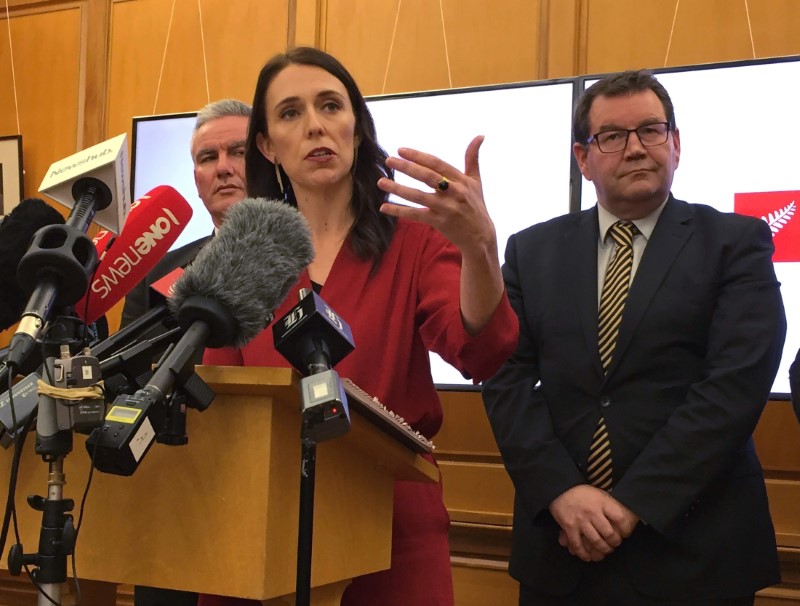By Charlotte Greenfield and Ana Nicolaci da Costa
WELLINGTON (Reuters) - New Zealand Prime Minister-elect Jacinda Ardern said she would spend Friday ironing out issues and ministerial posts with coalition partner New Zealand First, a day after becoming the Pacific nation's youngest leader in recent times.
The previous night's highly anticipated announcement by New Zealand First leader Winston Peters that he would support 37-year-old Ardern's Labour Party had ended a decade of center-right National rule and spelt big changes for the country's economy.
The New Zealand dollar - the world's 11th-most traded currency - fell to five-month lows as investors grappled with heightened uncertainty and a more protectionist agenda.
"When you are a hands off government, when you simply allow markets to decide the fate of your people, then that does not serve a country or it's people well," Ardern told reporters in Wellington.
"You will see a proactive government by Labour."
Labour has released the names of the people who would be in the cabinet, saying it would announce their portfolios next week.
The include Grant Robertson, Labour's spokesman for finance, and David Parker, spokesman for trade.
Ardern said on Thursday she had offered the role of deputy prime minister to Peters, who on Thursday gave his backing to Labour after inconclusive Sept.23 elections, and he was considering it.
On Thursday evening, Labour said it would also stick to its promises to change the central bank's mandate and seek to renegotiate the Trans-Pacific Partnership trade deals.
PROTECTIONISM
Concerns about a more protectionist agenda weighed on the currency and stock markets on Friday.
The New Zealand dollar fell to five month-lows of $0.6971 against the U.S. dollar, after posting its biggest daily fall in more than a year on Thursday.
"The sentiment has now shifted toward more protectionist measures," said Christina Leung, economist at New Zealand Institute of Economic Research.
"Generally, financial markets don't like change, there is uncertainty over what this all means ... in the meantime that is reducing demand for New Zealand assets, and that's why we are seeing the decline in the New Zealand dollar."
The stock market was down 1.1 percent at the Friday open, but later recouped losses to stand in positive territory.
Ardern told radio earlier that most of the party's flagship policies, including a ban on some foreign ownership of housing, had survived the negotiations with Peters in recent weeks.
"With New Zealand First we've got a few more details to iron out," Ardern said. "Our plan remains, with a few minor changes ... we're finalizing in the next 24 hours the detail."
The election thrust the country into political limbo for almost a month with neither major party winning enough seats to form a majority and giving New Zealand First the balance of power.
New Zealand First and Labour also needed support from the progressive Green Party, which said it would strike a "confidence and supply" agreement, meaning it was officially outside government but would hold ministerial posts and vote on key pieces of legislation like the budget.

Ardern said the parties would release their agreements early next week and an announcement on ministerial posts would come later in the week.